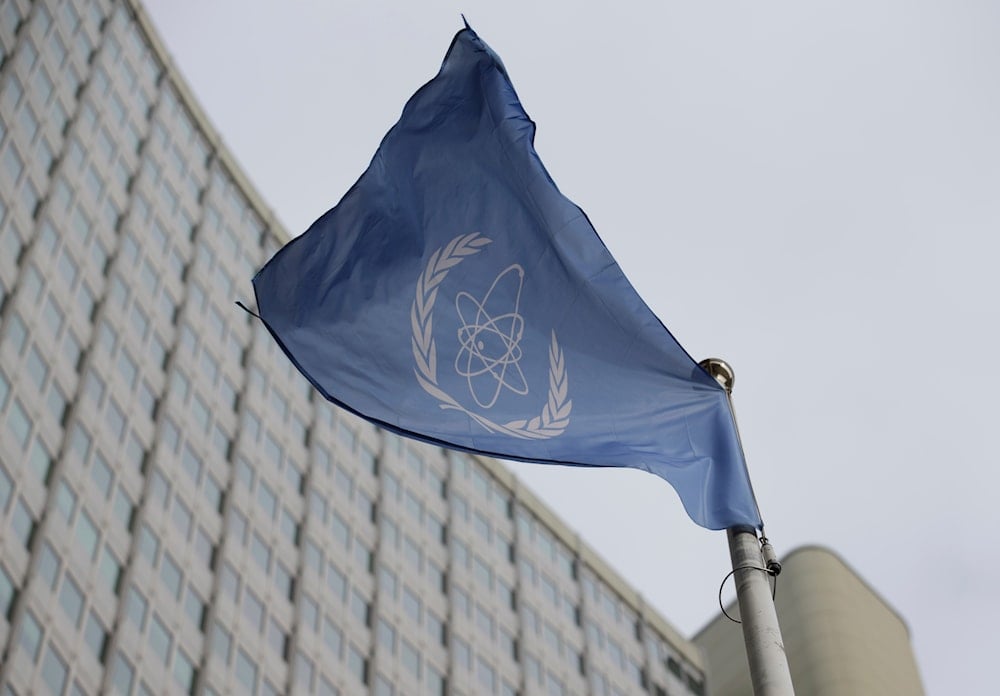Al Mayadeen acquires the Western-proposed IAEA resolution on Iran
A confidential draft resolution by the US and European nations accuses Iran of non-compliance with IAEA nuclear safeguards, hinting at possible UN Security Council involvement.
-

The flag of the International Atomic Energy Agency flies in front of its headquarters during an IAEA Board of Governors meeting in Vienna, Austria, on Feb. 6, 2023. (AP)
Al Mayadeen has acquired the preliminary draft of the resolution against Iran proposed by the US and European nations, currently under confidential discussions at the International Energy Agency's Board of Governors meetings. The draft may be revised until Wednesday.
The draft report suggests that Western nations are subtly implying a possible role for the UN Security Council in one of its sections, though they stop short of openly confirming that the resolution will be sent to the Council.
The draft resolution accuses Iran of not fully cooperating with its nuclear safeguards agreement, obstructing the IAEA's ability to verify activities and investigate undeclared sites. It also highlights Iran's repeated failure to provide plausible technical explanations for traces of man-made uranium found at several undisclosed locations.
The Western draft resolution states that "Iran's failure" to cooperate with the IAEA poses a major obstacle to the agency's ability to verify the peaceful nature of Iran's nuclear program and constitutes non-compliance with its safeguards obligations, leaving the IAEA unable to confirm whether nuclear materials covered under the agreement have been diverted toward nuclear weapons or other explosive devices.
The resolution suggests a possible UN Security Council role, noting that when the IAEA chief cannot confirm Iran's nuclear program is purely peaceful, it becomes a matter for the Security Council, the main UN body tasked with preserving global peace and security.
The draft resolution calls on the IAEA Director General to continue implementing this Western-proposed resolution and previous ones. It also requests a new report covering any further developments regarding the issues raised in the resolution.
The Western draft resolution calls on Iran to:
- Provide technically credible explanations for the presence of human-made uranium particles at two undeclared sites in Iran.
- Inform the IAEA of the current locations of nuclear materials and contaminated equipment.
- Grant the IAEA access to requested sites and materials, as well as allow sample collection as deemed necessary by the agency.
- Emphasizes that Iran’s provision of this information and access, followed by subsequent IAEA verification, is essential for the Secretariat to resolve outstanding issues.
- Urges Iran to promptly address its non-compliance with safeguards agreements by taking all steps deemed necessary by the IAEA and the Board of Governors.
- Reaffirms support for a diplomatic resolution to concerns over Iran’s nuclear program, leading to an agreement that addresses all international issues related to Iran’s nuclear activities.
Earlier on Monday, Iran stepped up its condemnation of the US, France, Britain, and Germany, alleging that they are exploiting the International Atomic Energy Agency (IAEA) for political purposes to pressure Tehran. The sharp criticism coincides with these nations preparing to present an anti-Iran resolution during this week’s IAEA Board of Governors meeting in Vienna.
Baqaei emphasized that the Islamic Republic has fully complied with its obligations under the Non-Proliferation Treaty (NPT) and the Comprehensive Safeguards Agreement, while accusing Western nations of distorting the role of the International Atomic Energy Agency (IAEA) to advance their own geopolitical agendas.
On another note, the Director-General of the International Atomic Energy Agency (IAEA), Rafael Grossi, has stated that while the agency has found “some issues” during its inspections, there is no conclusive evidence to indicate the existence of an “unnatural nuclear program” in Iran.
“We found some issues, but there is no conclusive evidence to suggest the existence of an unnatural nuclear program,” Grossi said, adding that the IAEA does not make accusations, but rather investigates based on factual findings. “The claims that Iran's nuclear program is not peaceful cannot be verified. There are no accusations; we are talking about certain reports.”
Grossi acknowledged that while Iran has not provided fully clear answers to all outstanding questions, “there are new elements that did not exist in 2015,” the year the Joint Comprehensive Plan of Action (JCPOA) was signed. However, he declared the JCPOA “tailored for the circumstances at the time,” saying “its time is up” and that the agreement “cannot be revived.”

 4 Min Read
4 Min Read









